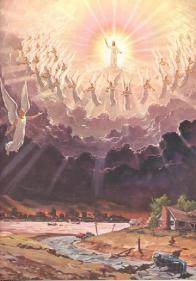SHOULD CHRISTIANS OBSERVE THE JEWISH SABBATH?
THE 4TH COMMANDMENT
A recent conversation with Bill Keith, national president of Business Men’s Fellowship USA, highlights the question about whether Christians should observe the Jewish Sabbath.
“Bill, what do you think? Should Christians consider keeping the Jewish Sabbath?” I said while riding in his car on a return trip from a district meeting in Santa Clara, California.
“Really? Are you kidding?” Bill said, turning his head toward me for a moment.
“No, I’m serious.”
“You’re the second person to suggest this to me in the last couple of weeks. Isn’t that being a little legalistic?” asked Bill.
“Not really.”
He responded: “I minister six days a week. So, Sundays are when I recharge my batteries and can devote special time to the Lord. Don’t you think Sundays are good enough to satisfy the Sabbath requirements?”
“Well, Jesus is our Jewish King. Shouldn’t we keep that in mind?” I said.
“That’s a good point,” he said. “But let me ask, why didn’t the fathers of our Christian faith in America, men like John Wesley, George Whitefield, Jonathan Edwards, Charles Finney, Dwight Moody or even Billy Graham mention something about honoring the Jewish Sabbath on Saturdays rather than holding church services on Sundays?”
A sudden snow storm in the Grapevine area of Interstate 5 cut short our discussion on the subject.
Why doesn’t Christianity observe the Jewish Sabbath anymore?
In his book “The Restitution of All Things: Israel, Christians, and the End of the Age,” Joseph Farah devotes a whole chapter to this question. He writes: “If the Ten Commandments are for today, then what about the fourth – interestingly, the longest of all?”
Remember the Sabbath Day to keep it holy … (Exodus 20:8-11)
Farah goes on to prove there are no scriptural reasons for moving church services from the Sabbath day of Saturday to Sunday. He states that it was “clearly an extra-biblical development.”
He details the efforts by Justin Martyr, Ignatius, Eusebius and others to separate Christianity from its Jewish roots. Then, he explains how Emperor Constantine used the Council of Laodicea in the fourth century to “determine it would be illegal – by force of Roman law – for either Jews or Christians to observe the seventh-day Sabbath.”
There’s no doubt Farah proves the point in his book that holding church services on Sunday rather than on the Jewish Sabbath of Saturday is based on tradition, dating from the fourth century, rather than on scriptural references or first-century church practices.
Should Christians reverse this tradition by returning to Saturday services, honoring the Jewish Sabbath?
Farah states: “If God’s commandments were in place before Jesus, during His earthly reign (when He fulfilled them), and in the first-century apostolic age – and will be in place when He returns – shouldn’t we be observing them today?”
Dr. Michael Brown, who is a Messianic Jewish believer, a Ph.D. holder in Near Eastern Languages and Literature, a recognized expert on the Old Testament and Jewish apologetics, and a fellow WND columnist, would probably raise his hand right now and say, “Not so fast there! My turn to talk.”
Brown agrees with Farah that “there is no biblical support for the view that after the resurrection of Jesus, the Sabbath was changed to Sunday. … It was not until the fourth-century that the church declared that the Sabbath had been moved to Sunday, with the question begging to be asked, ‘By what authority did you do this?'”
Yet, Brown offers some different views on the other points: “The seventh-day Sabbath was given as a special sign between God and Israel. (Exodus 31:17 and Ezekiel 20:12, 20) God did not call any other nation to observe the Sabbath, although He did open the door for the Gentiles to join themselves to His covenant with Israel.” (Isaiah 56:4-7)
Brown further states: “On the other hand, since God never commanded Gentile believers to observe the seventh-day Sabbath – it is simply not stated in the New Testament – there is no reason why they cannot set Sunday aside as a special day of rest and worship for the Lord, thereby incorporating the principle of Sabbath in their lives.”
Two different views from two men of God who love the Lord.
What’s my opinion?
I like Farah’s straightforward, nonjudgmental writing style, but I am a shrimp-and-lobster-eating Gentile believer. So for now, I will hang my hat with Bill Keith’s and Dr. Michael Brown’s camp on the subject of observing the Sabbath on a Sunday, or even another day, rather than just on Saturdays.
So, let no one judge you in food or in drink, or regarding a festival or a new moon or Sabbaths, which are a shadow of things to come, but the substance is of Christ. (Colossians 2:16-17)
Our ultimate rest and peace is found in the person named Jesus Christ, not in any special day.
But there is a deep stirring inside me, one that I can’t fully explain, which believes that Joseph Farah has blown a prophetic trumpet with his book. I can’t say the stirring is a “Thus saith the Lord” message from the throne room of heaven, but I feel the Lord will ask many believers to stand closely with Jews as anti-Semitism ramps itself up to a higher pitch in America. One of the ways we will stand with Jews will be by voluntarily observing the Sabbath with them.
If that happens, I will bow my knees next to Mr. Farah and whisper, “Mazl tov, brother! You were spot on.” http://mobile.wnd.com/2018/03/should-christians-observe-the-jewish-sabbath/?cat_orig=faith
Who is online
463 visitors


